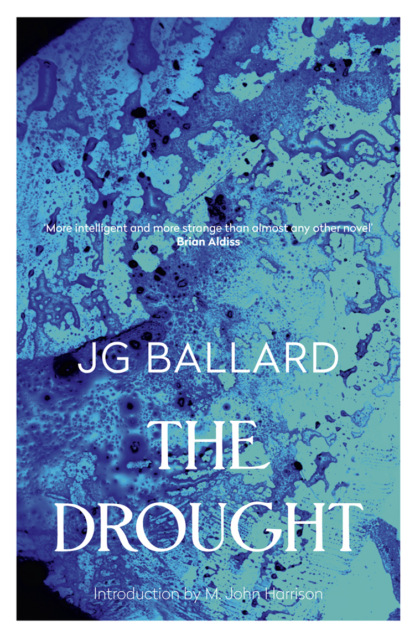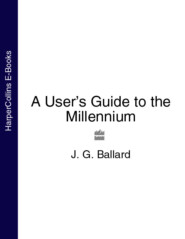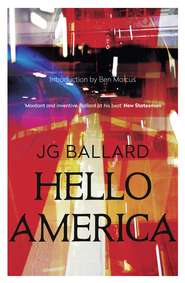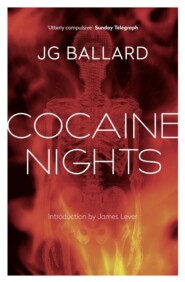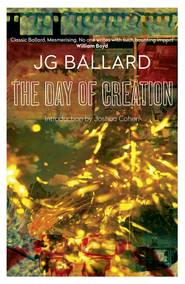По всем вопросам обращайтесь на: info@litportal.ru
(©) 2003-2024.
✖
The Drought
Настройки чтения
Размер шрифта
Высота строк
Поля
Covering the off-shore waters of the world's oceans, to a distance of about a thousand miles from the coast, was a thin but resilient mono-molecular film formed from a complex of saturated long-chain polymers, generated within the sea from the vast quantities of industrial wastes discharged into the ocean basins during the previous fifty years. This tough, oxygen-permeable membrane lay on the air-water interface and prevented almost all evaporation of surface water into the air space above. Although the structure of these polymers was quickly identified, no means was found of removing them. The saturated linkages produced in the perfect organic bath of the sea were completely non-reactive, and formed an intact seal broken only when the water was violently disturbed. Fleets of trawlers and naval craft equipped with rotating flails began to ply up and down the Atlantic and Pacific coasts of North America, and along the sea-boards of Western Europe, but without any long-term effects. Likewise, the removal of the entire surface water provided only a temporary respite – the film quickly replaced itself by lateral extension from the surrounding surface, recharged by precipitation from the reservoir below.
The mechanism of formation of these polymers remained obscure, but millions of tons of highly reactive industrial wastes – unwanted petroleum fractions, contaminated catalysts and solvents – were still being vented into the sea, where they mingled with the wastes of atomic power stations and sewage schemes. Out of this brew the sea had constructed a skin no thicker than a few atoms, but sufficiently strong to devastate the lands it once irrigated.
This act of retribution by the sea had always impressed Ransom by its simple justice. Cetyl alcohol films had long been used as a means of preventing evaporation from water reservoirs, and nature had merely extended the principle, applying a fractional tilt, at first imperceptible, to the balance of the elements. As if further to tantalize mankind, the billowing cumulus clouds, burdened like madonnas with cool rain, which still formed over the central ocean surfaces, would sail steadily towards the shorelines but always deposit their cargo into the dry unsaturated air above the sealed offshore waters, never on to the crying land
7 The Face (#ulink_2346a923-0ba4-56f1-8ebd-a22c83235a39)
A police car approached along the avenue and stopped fifty yards away. After a discreet interval, stemming more from custom than any sense of propriety, Judith Ransom stepped out. She leaned through the window, talking to Captain Hendry. After checking her watch against his, she hurried up the drive. She failed to notice Ransom sitting in the dust-covered car, and went on into the house.
Ransom waited until she had gone upstairs. He stepped from the car and strolled down towards Hendry. Ransom had always liked the police captain, and during the past two years their relationship had become the most stable side of the triangle – indeed, Ransom sometimes guessed, its main bond. How long Judith and Hendry would survive the rigours of the beach alone remained to be seen.
As Ransom reached the car Hendry put down the map he was studying.
‘Still here, Charles? Don't you feel like a few days at the beach?’
‘I can't swim.’ Ransom pointed to the camping equipment in the back seat. ‘All that looks impressive. A side of Judith's character I never managed to explore.’
‘I haven't either – yet. Perhaps it's just wishful thinking. Do I have your blessing?’
‘Of course. And Judith too, you know that.’
Hendry gazed up at Ransom. ‘You sound completely detached, Charles. What are you planning to do – wait here until the place turns into a desert?’
Ransom drew his initials in the dust behind the windscreen wiper. ‘It seems to be a desert already. Perhaps I'm more at home here. I want to stay on a few days and find out.’
‘Rather you than me. Do you think you really will leave?’
‘Certainly. It's just a whim of mine, you know.’
But something about Hendry's changed tone, the note of condescension, reminded Ransom that Hendry might resent his sense of detachment more than he imagined. He talked to the captain for a few minutes, then said goodbye and went indoors.
He found Judith in the kitchen, rooting in the refrigerator. A small stack of cans stood in a carton on the table.
‘Charles—’ She straightened up, brushing her blonde hair off her angular face. ‘That beard – I thought you were down at the river.’
‘I was,’ Ransom said. ‘I came back to see if I could do anything for us. It's rather late in the day.’
Judith watched him with a neutral expression. ‘Yes, it is,’ she said matter-of-factly. She bent down to the refrigerator again, flicking at the greasy cans with her well-tended nails.
‘I've been dividing things up,’ she explained. ‘I've left you most of the stuff. And you can have all the water.’
Ransom watched her seal the carton, then search for string in the cupboard, sweeping the tail of her linen coat off the floor. Her departure, like his own from the house, involved no personal component whatsoever. Their relationship was now completely functional, like that of two technicians who had successfully tried to install a complex domestic appliance.
‘I'll get your suitcase.’ She said nothing, but her grey eyes followed him to the stairs.
When he came down she was waiting in the hall. She picked up the carton. ‘Charles, what are you going to do?’
Despite himself, Ransom laughed. In a sense the question had been prompted by his beachcomber-like appearance and beard, but the frequency with which he had been asked it by so many different people made him realize that his continued presence in the deserted town, his apparent acceptance of the silence and emptiness, in some way exposed the vacuum in their lives.
He wondered whether to try to convey to Judith his involvement with the changing role of the landscape and river, their metamorphosis in time and memory. Catherine Austen would have understood his preoccupations, and accepted that for Ransom the only final rest from the persistence of memory would come from his absolution in time. But Judith, as he knew, hated all mention of the subject, and for good reason. Woman's role in time was always tenuous and uncertain.
Her pale face regarded his shadow on the wall, as if searching for some last clue in this map-like image. Then he saw that she was watching herself in the mirror. He noticed again the marked lack of symmetry in her face, the dented left temple that she tried to disguise with a fold of hair. It was as if her face already carried the injuries of an appalling motor-car accident that would happen somewhere in the future. Sometimes Ransom felt that Judith was aware of this herself, and moved through life with this grim promise always before her.
She opened the door on to the dusty drive. ‘Good luck, Charles. Look after that Jordan boy.’
‘He'll be looking after me.’
‘I know. You need him, Charles.’
As they went out into the drive enormous black clouds were crossing the sky from the direction of Mount Royal.
‘Good God!’ Judith started to run down the drive, dropping her bag. ‘Is that rain?’
Ransom caught up with her. He peered at the billows of smoke rising from the dark skyline of the city. ‘Don't worry. It's the city. It's on fire.’
After she and Hendry had gone he went back to the house, the image of Judith's face still in his eyes. She had looked back at him with an expression of horror, as if frightened that she was about to lose everything she had gained.
8 The Fire Sermon (#ulink_eaf3fa76-d43b-5a57-919e-4c7817ac1b5e)
For the next three days the fires continued to burn in Mount Royal. Under a sky stained by an immense pall of black smoke, like a curtain drawn over the concluding act of the city, the long plumes rose high into the air, drifting away like the fragments of an enormous collapsing message. Mingled with the fires of incinerators and abandoned garbage, they transformed the open plain beyond the city into an apocalyptic landscape.
From the roof of his house, Ransom watched the motor-bridge across the river, waiting for the last inhabitants of the city to leave for the south. By now Hamilton was empty. With the exception of the Reverend Johnstone and his last parishioners, all Ransom's neighbours had gone. He strolled among the deserted streets, watching the dust columns rising into the sky from a landscape that seemed to be on fire. The light, ashy dust blown across the lakeside town from the hundreds of incinerators on the outskirts of the city covered the streets and gardens like the fall-out from a volcano.
Much of the time Ransom spent by the river, or walking out across the bed of the lake. Inshore, the slopes of damp mud had already dried into a series of low dunes, their crests yellowing in the heat. Wandering among them, out of sight of the town, Ransom found the hulks of sunken yachts and barges, their blurred forms raised from the weary limbo to await the judgment of the sun. Ransom built a crude raft out of pieces of driftwood and punted himself across the lagoons of brackish water, making his way in a wide circle back towards the river.
Although still narrowing, the channel was too deep to ford. As viscous and oily as black treacle, it leaked slowly between the white banks. Only the elusive figure of Philip Jordan, punting his arrow-like skiff in and out of the thermal pools, gave it any movement. Once or twice Ransom called to him, but the youth waved and vanished with a glimmer of his pole, intent on some private errand. A few craft sat on the surface, reflected in the sinking mirror. At intervals throughout the day a siren would give a mournful hoot, and the old steamer, still commanded by Captain Tulloch, would make its way up-river. Then, with another hoot, it would move off into the haze over the lake, disappearing among the narrow creeks.
It was during this time that Ransom again became aware of the significance of each day. Perhaps this was because he knew he would be able to stay on in Hamilton for a further two or three weeks at the most. After that, whatever happened, and even if he chose to stay behind, his existence would be determined by a new set of rules, probably those of chase and pursuit. But until then a finite period remained, the unending sequence of day following day had given way to a sharply defined quantum of existence. Superficially the streets and houses resembled those of the normal world. The lines that once marked its boundaries still formed a discreet but unreal image, like the false object seen in a convex mirror.
To his surprise, however, Ransom felt little urge to visit his houseboat. It remained quietly at its mooring, the condensation of a distant private universe.
On Sunday, the last day of this short interregnum, Ransom visited the Presbyterian church on the corner of Amherst Avenue to hear what he assumed to be the Reverend Johnstone's concluding sermon. During this period the minister had been busy with the few remaining members of his militia, driving about in his jeep with bales of barbed wire and crates of supplies, fortifying their houses for use as strongpoints in the final Armageddon to come. Curious to see how Johnstone was responding to the transformation of Hamilton and the city, Ransom walked down to the church and entered the aisle just as the small, manually operated organ concluded its short voluntary.
He took his seat in one of the pews halfway down the nave. Johnstone left the organ and began to read the lesson from the lectern. The church was almost empty, and Johnstone's strong voice, as belligerent as ever, reverberated off the empty pews. Below him, in the front row, sat his small, dove-haired wife and three unmarried daughters, wearing their floral hats. Behind them were the two or three families who still remained, the men's shot-guns discreetly out of view.
After the hymn, Johnstone mounted the pulpit and began his sermon, taking as his text Chapter IV, Verse 8, of the Book of Jonah: ‘And it came to pass, when the sun did arise, that God prepared a vehement east wind; and the sun beat upon the head of Jonah, that he fainted, and wished in himself to die, and said, It is better for me to die than to live.’ After a brief resume of the previous career of Jonah, whose desire for the early destruction of Nineveh and the Gentiles he seemed generally to approve, Johnstone went on to compare the booth the Lord had built for Jonah to the east of Nineveh with the church in whose safety they now sat, waiting for the destruction of Mount Royal and the world beyond.
At this point, as Johnstone warmed to his theme, he glanced down the nave with a slight start. Ransom looked over his shoulder. Standing between the pews at the rear of the church, caps in hand, were some twenty of the fishermen, their thin faces staring down the aisle at the pulpit. For a few moments they stood together, listening to Johnstone as he drew breath and continued his peroration. Then they shuffled into the pews at the back. Exposed behind them through the open door, the billows of smoke drifted across the roof-tops from Mount Royal.
Surprised by their visit to the church, in their black shabby clothes and old boots, Ransom moved down to the end of the pew, from where he could glance back at the fishermen. Their faces had the closed expressions of a group of strikers or unemployed, biding their time until given the word to act.
Below the pulpit there were whispered exchanges, and a gun barrel moved uneasily, but the Reverend Johnstone took the new arrivals in his stride. His eyes roved along the lines of sullen faces. Raising his voice, he recapitulated what he had said so far. Then he went on to expand upon his theme, comparing Jonah's wish for the destruction of Nineveh with mankind's unconscious hopes for the end of their present world. Just as the withering of Jonah's gourd by the worm was part of the Lord's design, so they themselves should welcome the destruction of their homes and livelihoods, and even their very shelter from the drought, knowing that God's grace would come to them only through this final purging fire.
The fishermen's eyes were fixed on Johnstone's face. One or two leaned forward, hands clasping the pew in front, but most of them sat upright. Johnstone paused before his homily, and there was a brief shuffle. The entire group of fishermen rose to their feet, and without a backward glance made their way from the church.
The Reverend Johnstone stopped to let them go, quietening the front pews with a raised hand. He eyed the retreating figures with his head to one side, as if trying to sum up their motives for coming to the church. Then, in a lower voice, he called his depleted congregation to prayer, glancing through his raised hands at the open doors.
Ransom waited, and then slipped away down the aisle and stepped out into the sunlight. In the distance he caught a last glimpse of the black-clad figures moving between the cars, the smoke clouds crossing the avenue over their heads.





